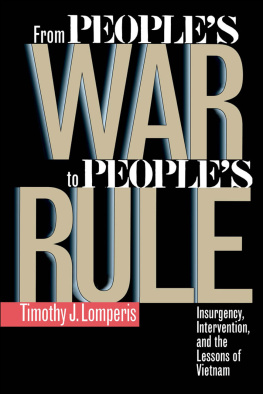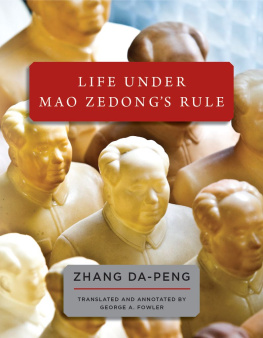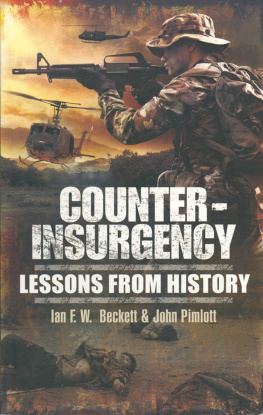Timothy J. Lomperis - From Peoples War to Peoples Rule: Insurgency, Intervention, and the Lessons of Vietnam
Here you can read online Timothy J. Lomperis - From Peoples War to Peoples Rule: Insurgency, Intervention, and the Lessons of Vietnam full text of the book (entire story) in english for free. Download pdf and epub, get meaning, cover and reviews about this ebook. year: 1996, publisher: Univ of North Carolina Press, genre: Politics. Description of the work, (preface) as well as reviews are available. Best literature library LitArk.com created for fans of good reading and offers a wide selection of genres:
Romance novel
Science fiction
Adventure
Detective
Science
History
Home and family
Prose
Art
Politics
Computer
Non-fiction
Religion
Business
Children
Humor
Choose a favorite category and find really read worthwhile books. Enjoy immersion in the world of imagination, feel the emotions of the characters or learn something new for yourself, make an fascinating discovery.
- Book:From Peoples War to Peoples Rule: Insurgency, Intervention, and the Lessons of Vietnam
- Author:
- Publisher:Univ of North Carolina Press
- Genre:
- Year:1996
- Rating:3 / 5
- Favourites:Add to favourites
- Your mark:
- 60
- 1
- 2
- 3
- 4
- 5
From Peoples War to Peoples Rule: Insurgency, Intervention, and the Lessons of Vietnam: summary, description and annotation
We offer to read an annotation, description, summary or preface (depends on what the author of the book "From Peoples War to Peoples Rule: Insurgency, Intervention, and the Lessons of Vietnam" wrote himself). If you haven't found the necessary information about the book — write in the comments, we will try to find it.
Timothy J. Lomperis: author's other books
Who wrote From Peoples War to Peoples Rule: Insurgency, Intervention, and the Lessons of Vietnam? Find out the surname, the name of the author of the book and a list of all author's works by series.
From Peoples War to Peoples Rule: Insurgency, Intervention, and the Lessons of Vietnam — read online for free the complete book (whole text) full work
Below is the text of the book, divided by pages. System saving the place of the last page read, allows you to conveniently read the book "From Peoples War to Peoples Rule: Insurgency, Intervention, and the Lessons of Vietnam" online for free, without having to search again every time where you left off. Put a bookmark, and you can go to the page where you finished reading at any time.
Font size:
Interval:
Bookmark:
The University of North Carolina Press
All rights reserved
Manufactured in the United States of America
Lomperis, Timothy J., 1947
intervention, and the lessons of Vietnam / Timothy J.
Lomperis.
p. cm.
Includes bibliographical references and index.
ISBN 0-8078-2273-6 (cloth: alk. paper).
ISBN 0-8078-4577-9 (pbk.: alk. paper)
1. Vietnamese Conflict, 19611975United States. 2. VietnamHistory19451975. 3. Asia, SoutheasternPolitics and government1945- 4. InsurgencyAsia, Southeastern. 5. United StatesForeign relations, 19631969. I. Title.
DS558.L64 1996
959.7043373dc20 95-36667
CIP
Ana Maria
for her steadfast faith and abundant love
and to
Kristi and John Scott
for their therapeutic cheerfulness
- 1.1. Insurgencies and Intervention,
- 3.1. Domestic Legitimacy,
- 11.1. Comparative Legitimacy,
- 11.2. Comparative Intervention,
- 11.3. Alternative Explanation: Leadership/Strategy (L/S),
- 11.4. Candidate Lessons,
- 1.1. Balance of Intervention in Vietnam I: Franco-Viet Minh War, 19461954,
- 1.2. Balance of Intervention in Vietnam II: American Phase, 19601975,
- 1.3. Balance of Intervention in China, 19271949,
- 1.4. Balance of Intervention in Greece, 19411949,
- 1.5. Balance of Intervention in the Philippines, 19461956,
- 1.6. Balance of Intervention in Malaya, 19481960,
- 1.7. Balance of Intervention in Cambodia, 19701975,
- 1.8. Balance of Intervention in Laos, 19551975,
- 3.1. Transition from Traditional to Modern Society,
- 3.2. External Legitimacy Effects,
- 3.3. Insurgency: Exogenous and Independent Variables,
- 11.1. Benchmarks of Insurgent Success: Vietnam I,
- 11.2. Benchmarks of Insurgent Success: Vietnam II,
- 11.3. Benchmarks of Insurgent Success: China,
- 11.4. Benchmarks of Insurgent Success: Greece,
- 11.5. Benchmarks of Insurgent Success: Philippines,
- 11.6. Benchmarks of Insurgent Success: Malaya,
- 11.7. Benchmarks of Insurgent Success: Cambodia,
- 11.8. Benchmarks of Insurgent Success: Laos,
- 11.9. Benchmarks of Insurgent Success: Prognosis on Peru,
Font size:
Interval:
Bookmark:
Similar books «From Peoples War to Peoples Rule: Insurgency, Intervention, and the Lessons of Vietnam»
Look at similar books to From Peoples War to Peoples Rule: Insurgency, Intervention, and the Lessons of Vietnam. We have selected literature similar in name and meaning in the hope of providing readers with more options to find new, interesting, not yet read works.
Discussion, reviews of the book From Peoples War to Peoples Rule: Insurgency, Intervention, and the Lessons of Vietnam and just readers' own opinions. Leave your comments, write what you think about the work, its meaning or the main characters. Specify what exactly you liked and what you didn't like, and why you think so.





